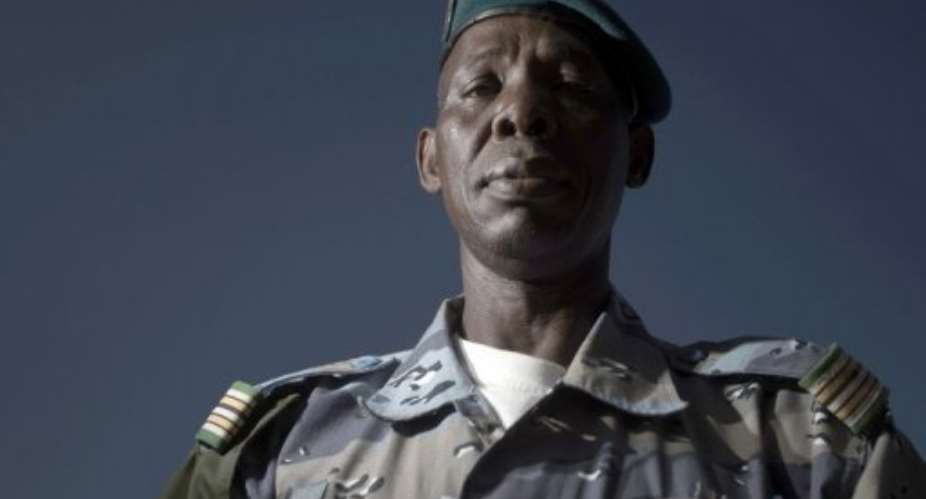GAO, Mali (AFP) - Amid the chaos of Gao in strife-torn northern Mali, paramilitary police Colonel Salihou Maiga describes himself as a "law-abiding man" who will bring wrongdoers to justice, including Malian soldiers.
Welcoming AFP journalists to his headquarters set up in a former clinic, Maiga pledges fair treatment for armed Islamists and the army alike at a time when rights groups are accusing troops of atrocities, including summary executions.
In the hallway, five detainees are sitting or lying on the floor of the clinic turned police station. "We're installed here because we no longer have a place," Maiga says apologetically. After 10 months of Islamist occupation, Gao, 1,200 kilometres (745 miles) from the capital Bamako, has no administration and public buildings have been looted.
A Tuareg of about 60, bearded and wearing a turban, hails the colonel. He says he wants a Tamashek interpreter, but "it's a little late, he has already gone home," says a policeman.
"The population of Ansongo denounced him. According to the public outcry, he was the commander of a MUJAO cell," Maiga says, referring to the fundamentalist Movement for Oneness and Jihad in West Africa (MUJAO), one of the armed groups that occupied northern Mali last year.
The man shakes his head in denial. "He says it isn't true (...) But we're going to send him to Bamako so that he can appear before a judge who will decide."
The colonel has his staff fetch Ousmane, a 23-year-old from neighbouring Niger who turned himself into the police with his weapon on Saturday.
"He said that he wanted to leave MUJAO to surrender," explains Master Sergeant Mohamed Ibrahim, who carried out his interrogation.
The thin young man has a deep purple mark around his neck, as if he has been tied or strung up. "He arrived like that," Ibrahim says. "Perhaps he was caught by villagers, but he simply said that he was hungry."
"In Niger, he heard that MUJAO was recruiting people who were well paid. So he came, but in two months, he hasn't been paid a cent," Maiga says.
The young man with large dark eyes took part in MUJAO patrols, according to gendarmerie staff. Like all "terrorist" suspects, he is due to be sent before a judge, either in Bamako or the central town of Sevare.
Ousmane walks unsteadily back to his cell. "It's a makeshift cell," Colonel Maiga says, sounding slightly flustered.
The room is less than four square metres (43 square feet) in size, dimly lit by daylight through a tiny barred window. The heat is stifling and the stench of urine overpowering. Eight mostly young men sit on the floor.
The policemen say that prisoners are held in such conditions for a maximum of three or four days.
Since he arrived in Gao on January 27, in the wake of the entry into the town of French and Malian troops who reclaimed it from the Islamists, Maiga has sent about 30 detainees on to judicial authorities.
"It's very few, but the others are dead. You really need to understand that these people don't come here to fight and fall back. They come to die," the colonel says.
According to Ousmane's account, many MUJAO fighters deserted after the movement pulled out in the face of the arrival of French and Malian forces. "He told us that some were caught and are now prisoners of MUJAO," Ibrahim says.
Another detainee denies having anything to do with the Islamist movement. "I've never been MUJAO," he yells. But the police say that the man was well known in Gao for having been a close aide to "Yoro", one of the MUJAO leaders in the town.
As soon as he arrived, Maiga explained "the rules" to his men. "In Bamako, I trained police in the criminal investigation department.
"In this gendarmerie, there hasn't been a single abuse. We have neither hit nor insulted anybody. We do our work with respect for republican values," he says.
"We have no right to commit abuses and we are also there to ensure that the soldiers don't carry out any," he adds.
Asked about allegations against the army made by human rights organisations, Maiga says that if there is proof, he will not hesitate to open proceedings against soldiers.
"Even after a rebellion, even after an insurrectional situation, the law must be respected," he declares with conviction.





 List of 24 ministerial nominees approved by Parliament
List of 24 ministerial nominees approved by Parliament
 You were my inspiration, made me who I am today – Lilian Kumah
You were my inspiration, made me who I am today – Lilian Kumah
 Rainstorm destroys Hohoe E.P. Senior High School building
Rainstorm destroys Hohoe E.P. Senior High School building
 John Kumah strongly supported me to become NPP flagbearer – Bawumia reveals
John Kumah strongly supported me to become NPP flagbearer – Bawumia reveals
 Late John Kumah urged me to run for NPP flagbearer, strongly supported me — Bawu...
Late John Kumah urged me to run for NPP flagbearer, strongly supported me — Bawu...
 Akufo-Addo appoints Joseph Kpemka as Deputy MD of BOST
Akufo-Addo appoints Joseph Kpemka as Deputy MD of BOST
 Ablakwa petitions CHRAJ to investigate sale of SSNIT's hotels to Rock City Hotel
Ablakwa petitions CHRAJ to investigate sale of SSNIT's hotels to Rock City Hotel
 MoF to provide new bailout for defunct Gold Coast Fund investors – Bawumia revea...
MoF to provide new bailout for defunct Gold Coast Fund investors – Bawumia revea...
 OMCs implement price adjustments despite International petroleum price declines
OMCs implement price adjustments despite International petroleum price declines
 Petition to remove Kissi Agyebeng will disrupt operations of OSP – Martin Kpebu
Petition to remove Kissi Agyebeng will disrupt operations of OSP – Martin Kpebu
